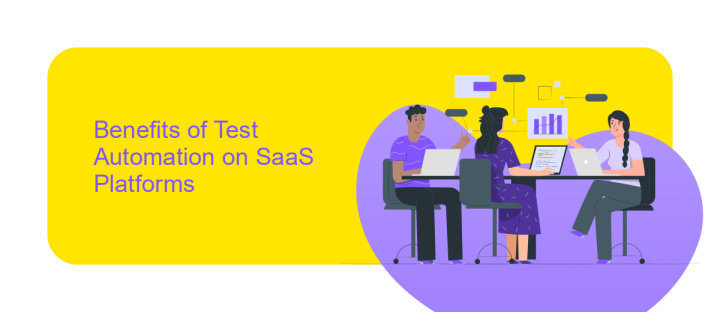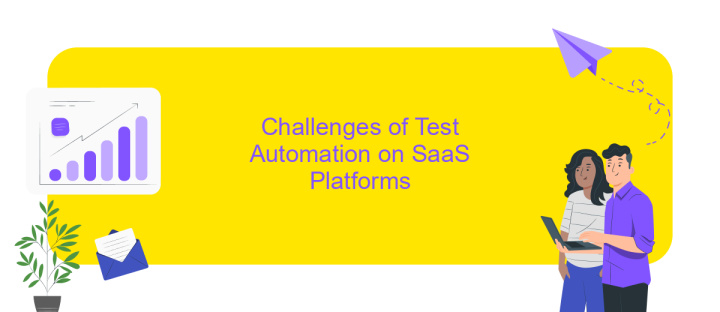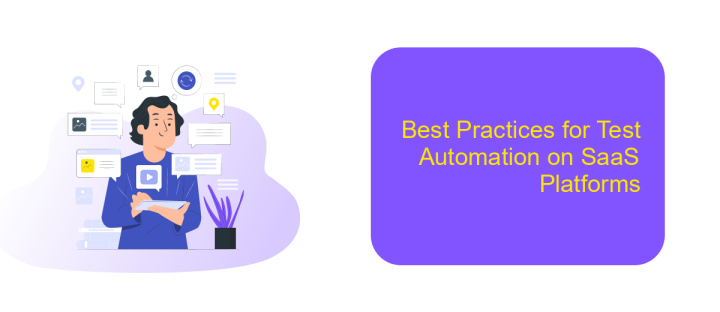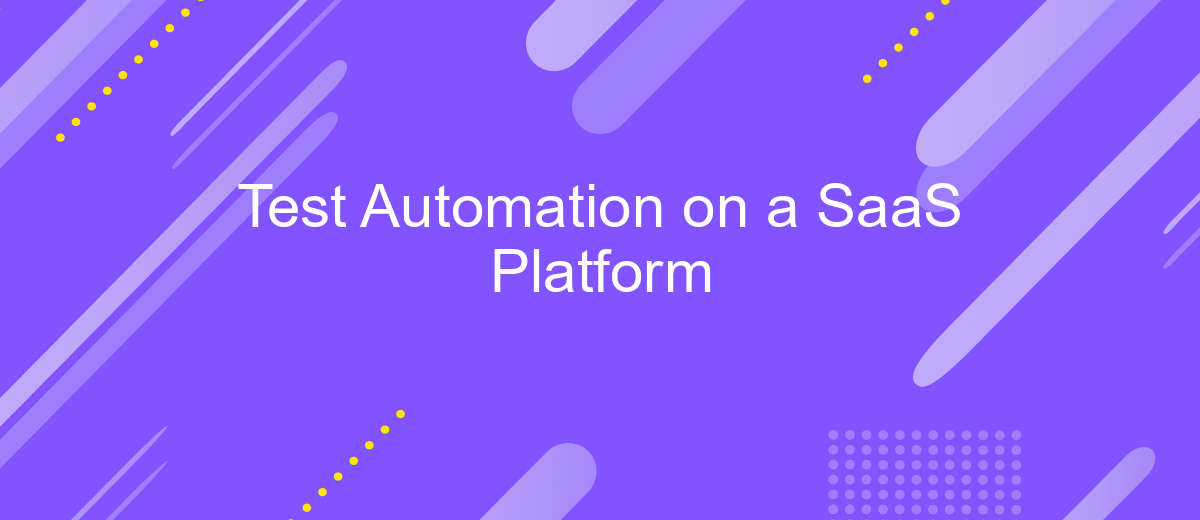Test Automation on a SaaS Platform
In today's fast-paced digital landscape, test automation on a SaaS platform has become essential for ensuring software quality and reliability. By automating repetitive and complex testing tasks, organizations can accelerate their development cycles, reduce human error, and enhance overall efficiency. This article explores the key benefits, challenges, and best practices of implementing test automation in a SaaS environment, providing valuable insights for businesses aiming to optimize their software delivery processes.
Introduction
In today's rapidly evolving digital landscape, Software as a Service (SaaS) platforms have become a cornerstone for businesses seeking scalable and flexible solutions. As these platforms grow in complexity, the need for efficient and reliable test automation has never been more critical. Test automation on a SaaS platform not only ensures the quality and performance of applications but also accelerates the development process, allowing for faster deployment and more frequent updates. By leveraging automated testing, organizations can maintain a competitive edge while minimizing risks associated with software failures.
- Enhances testing efficiency and coverage.
- Reduces manual testing efforts and errors.
- Facilitates continuous integration and delivery.
- Improves application reliability and performance.
- Decreases time-to-market for new features.
Implementing test automation on a SaaS platform involves understanding the unique challenges and opportunities that such environments present. From selecting the right tools and frameworks to designing robust test cases, each step requires careful consideration and strategic planning. As businesses continue to adopt SaaS solutions, mastering test automation becomes a vital component of ensuring seamless user experiences and maintaining the integrity of complex software ecosystems.
Benefits of Test Automation on SaaS Platforms

Implementing test automation on SaaS platforms offers numerous advantages, significantly enhancing the development and deployment process. One of the primary benefits is the acceleration of testing cycles. Automation allows for rapid execution of repetitive test cases, freeing up valuable time for developers to focus on more complex tasks. This leads to faster release cycles, enabling businesses to respond swiftly to market demands and maintain a competitive edge.
Moreover, test automation ensures consistent and reliable test coverage across various environments. By utilizing tools like ApiX-Drive, teams can seamlessly integrate and automate testing processes, reducing the risk of human error and ensuring data accuracy. This integration capability enhances collaboration between development and testing teams, fostering a more cohesive workflow. Additionally, automated testing provides comprehensive reporting and analytics, offering insights into performance and potential areas for improvement. Overall, test automation not only boosts efficiency but also enhances the quality and reliability of SaaS applications.
Challenges of Test Automation on SaaS Platforms

Test automation on SaaS platforms presents unique challenges that can complicate the development and maintenance of effective testing strategies. The dynamic nature of SaaS environments, characterized by frequent updates and changes, requires adaptable and robust automation frameworks. Additionally, the multi-tenancy model of SaaS solutions often introduces complexities in data management and security, which must be addressed in automated tests.
- Frequent Updates: SaaS platforms are regularly updated, necessitating continuous adjustments to test scripts.
- Data Security: Ensuring data privacy and security in a shared environment poses significant challenges for automation.
- Integration Complexity: SaaS solutions often integrate with other services, requiring comprehensive testing of APIs and interfaces.
- Scalability: Automated tests must be scalable to handle varying loads and user interactions efficiently.
- Environment Consistency: Maintaining consistent test environments across different instances can be difficult.
Addressing these challenges requires a strategic approach, leveraging advanced tools and practices to ensure that automated tests remain effective and reliable. Continuous integration and deployment pipelines, coupled with AI-driven testing tools, can help mitigate these issues by providing real-time feedback and adapting to changes swiftly. By focusing on these areas, organizations can enhance the quality and reliability of their SaaS offerings.
Best Practices for Test Automation on SaaS Platforms

Implementing test automation on SaaS platforms requires a strategic approach to ensure efficiency and reliability. Begin by understanding the unique characteristics of your SaaS environment, including its scalability and multi-tenancy features. This understanding will help tailor your test automation framework to address specific challenges and leverage the benefits of cloud-based solutions.
Next, prioritize test cases by identifying critical functionalities that directly impact user experience and business outcomes. Automated tests should focus on these areas to provide maximum value. Regularly review and update your test suite to accommodate new features and changes in the platform, ensuring continuous coverage and relevance.
- Utilize cloud-based testing tools for scalability and flexibility.
- Incorporate continuous integration and continuous deployment (CI/CD) for rapid feedback.
- Design tests to be reusable and maintainable for long-term efficiency.
- Ensure tests are isolated to avoid dependencies and flaky results.
- Monitor test performance and optimize for speed and accuracy.
Finally, foster collaboration between development and QA teams to streamline the automation process. Encourage knowledge sharing and continuous learning to keep up with evolving technologies and practices. By following these best practices, you can enhance the quality and reliability of your SaaS platform through effective test automation.
- Automate the work of an online store or landing
- Empower through integration
- Don't spend money on programmers and integrators
- Save time by automating routine tasks
Conclusion
In conclusion, implementing test automation on a SaaS platform significantly enhances the efficiency and reliability of software development processes. By automating repetitive and time-consuming testing tasks, teams can focus on more critical aspects of development, such as innovation and optimization. This not only accelerates the release cycles but also ensures a higher quality product, as automated tests can quickly identify and rectify issues that might otherwise go unnoticed in manual testing scenarios.
Furthermore, the integration of automation tools with platforms like ApiX-Drive can streamline the testing process by facilitating seamless connections between various services and applications. This capability allows for real-time data synchronization and more efficient workflow management, ultimately leading to a more cohesive and responsive development environment. As SaaS platforms continue to evolve, embracing test automation and leveraging integration services will be crucial for organizations aiming to maintain a competitive edge in an ever-changing technological landscape.
FAQ
What is test automation on a SaaS platform?
How can I integrate test automation with my existing SaaS applications?
What are the benefits of using test automation for SaaS platforms?
How do I choose the right test automation tools for my SaaS platform?
Can test automation be used for both functional and non-functional testing on a SaaS platform?
Time is the most valuable resource for business today. Almost half of it is wasted on routine tasks. Your employees are constantly forced to perform monotonous tasks that are difficult to classify as important and specialized. You can leave everything as it is by hiring additional employees, or you can automate most of the business processes using the ApiX-Drive online connector to get rid of unnecessary time and money expenses once and for all. The choice is yours!


